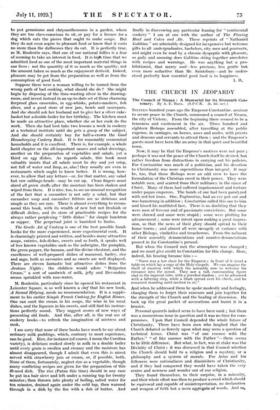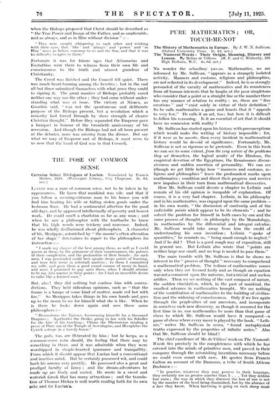THE CHURCH IN JEOPARDY
The Council of Nicaea : A Memorial for its Sixteenth Cen- tenary. By A. E. Burn. (S.P.C.K. 35. 6d. net.) SIXTEEN hundred years ago the Emperor Constantine, anxious to secure peace in the Church, summoned a council at Nicaea, the city of Victory. From the beginning there seemed to be a tenseness and excitement in the air. Three hundred and eighteen Bishops assembled, after travelling at the public expense. in carriages, on horses, asses and mules, with priests
and deacons and servants to attend them ; and the Emperor's guests must have been like an army in that quiet and beautiful town.
Now, it may be that the Emperor's motives were not pure ; perhaps it was not the peace of the Church itself he desired, but rather freedom from distractions in carrying out his policies. For Constantine was much of a politician, and his devotion to Christianity was more superstitious than integral. It may be, too, that those Bishops were an odd crew to have the formulation of the Christian creed in their power. They were notable men, and scarred from their militancy in the cause of Christ. Many of them had suffered imprisonment and torture under pagan emperors. The hands of one had been paralyzed with red-hot irons. One, Paphnutius, had an eye put out and was hamstrung in addition : Constantine called this one to him and kissed his mutilated face. There is no doubting that they were men of fervour and of passionate convictions. But some were shrewd and some were stupid ; some were plotting for advancement ; some were intent upon making a great impres- sion, so that the news of their glory should spread to their home towns ; and almost all were savagely at variance with other Bishops, vindictive and treacherous. From the mdment of their assembly denunciations and counter-denunciations poured in for Constantine's perusal.
But when the Council met the atmosphere was changed ; and we must give credit to Constantine for this change. Here, indeed, his bearing became him :— " There was a low chair for the Emperor ; in front of it stood a table on which lay a copy of the Holy Gospels. We can imagine the thrill of emotion with which the assembly rose to welcome his entrance into the synod. They saw a tall, commanding figure
j
clad in the imperial robe, with a jewelled diadem; yet he advanced with a faltering step, while a blush spread over his cheek, and he remained standing until invited to sit. '
And when he addressed them he spoke modestly and feelingly, charging them to forget their rancours and join together for the strength of the Church and the healing of dissension. He took up the great packet of accusations and burnt it in a brazier.
Personal quarrels indeed seem to have been sunk ; but there
was a momentous issue in question and it was no time for com- promises. Upon that Council depended the whole future of Christianity. There have been men who laughed that the Church debated so fiercely upon what may seem a question of technical terms. Christ was " of one essence with the Father," " of like essence with the Father "—there seems to be little difference. But what, in fact, was at stake was the Divinity of Christ : it was discussed in that Council whether the Church should hold to a religion and a mystery, or a philosophy and a system of morals. For Arius and his followers were rationalizers and diminishers of Christianity, and if they had conquered they would have taken the very centre and newness and wonder out of our religion.
They found themselves, to their surprise, in a minority, and their whole effort was then to produce a creed which should be equivocal and capable of misinterpretation, no declaration and weapon of faith but a mere aggregate of words. And so, when the Bishops proposed that Christ should be described as " the True Power and Image of the Father, and as unalterable, and as always, and as in Him without division " :-
"They were caught whispering to each other and winking with their eyes, that ' like ' and always ' and power ' and in Iiim' were, as before, common to us and the Son, and that it was no difficulty to agree to these."
Fortunate it was for future ages that Athanasius and Eustathius were there to witness from their own life and consciousness to the truth and utmost grandeur of Christianity.
The Creed was finished and the Council fell quiet. There was much heart-burning among the heretics ; but in the end all but three submitted themselves with what grace they could to signing it. The great number of Bishops probably cared neither one way nor the other ; they had come without under- standing what was at issue. The victory at Nicaea, as Gwatkin said, " was not the spontaneous and deliberate purpose of the Bishops present, but a revolution which a minority had forced through by sheer strength of clearer Christian thought." Before they separated the Emperor gave a banquet in honour of the twentieth anniversary of his accession. And though the Bishops had not all been present at the debates, none was missing from the dinner. But say what we may of Emperor and of Bishops, it must seem to 'us now that the hand of God was in that Council.



























































 Previous page
Previous page